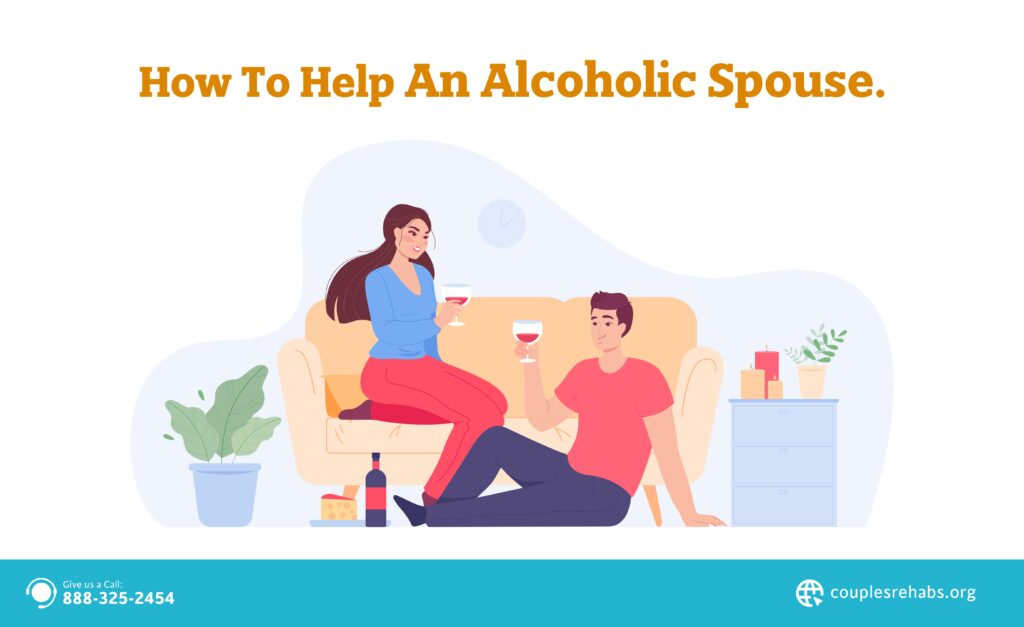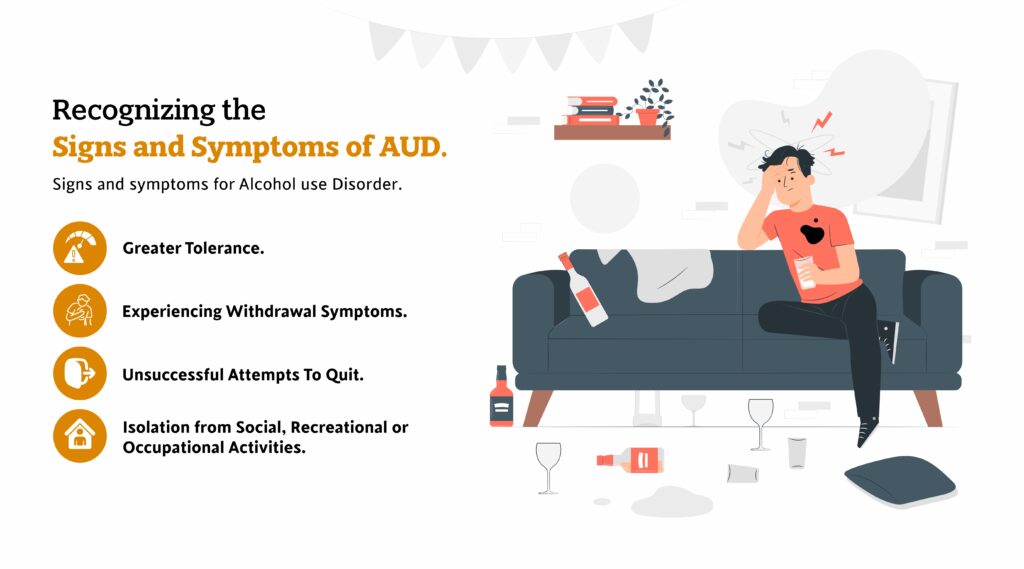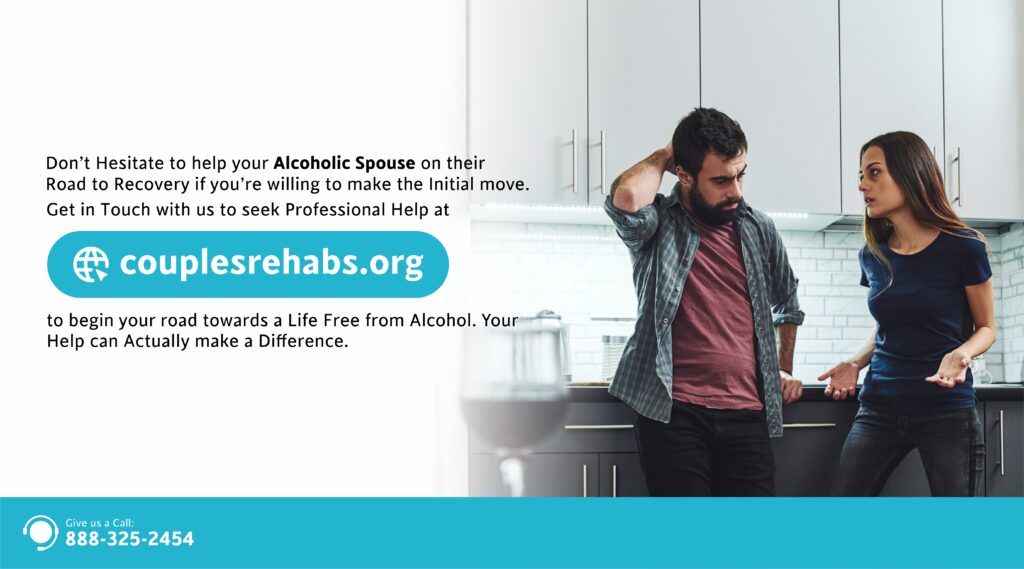How to Help an Alcoholic Spouse

Table of Contents
You can help your spouse through the challenges carried on by their compulsive drinking if they are struggling with an alcohol use disorder (AUD). You cannot fix your significant other’s addiction issues; however, there are ways you can help them recover and heal yourself as well. Alcohol addiction has been cited as the reason for 34.6% of all divorces in America. These stats show that you are not alone to look for guidance on how to help an alcoholic spouse.
Looking for couples rehab near me? Call us today to delve into the details of the essential steps on how to help an alcoholic spouse on their recovery journey.
How do you know if your spouse is addicted to alcohol?
According to the National Institute on Alcohol Abuse and Alcoholism, Alcohol use disorder (AUD) is a chronic medical condition affecting brain function, causing inability to control alcohol intake despite dangerous consequences, with mild to severe severity and relapse potential.
What may begin as sporadic binge drinking can turn into a daily battle that can impact not only your partner but you as well. If alcoholism is not treated, it usually gets worse. Hence, it is imperative to address this severe matter with understanding and empathy, recognizing that your spouse’s addiction is not a moral failure but rather the outcome of many different factors. Cohabiting with an alcoholic spouse can be difficult and emotionally draining, so be sure that you’re not alone in looking for guidance on how to help an alcoholic spouse get rid of addiction.
If your spouse is showing the following signs then you should heads-up
- Spend a lot time in drinking
- Make unsuccessful attempts to cut down on how much they are drinking
- Fail to fulfill domestic and work responsibilities
- Isolate from social activities to drink
- Develop a tolerance to alcohol, needing more to feel its impact
- Experience withdrawal symptoms like shaking, nausea, and sweating
Understand the complexities of alcoholism and begin supporting your partner on their road to recovery. Contact couplesrehabs.org and let us guide you on how to help an alcoholic spouse.
How to Help an Alcoholic Spouse?
Alcohol addiction recovery is a challenging and convoluted process, and success is often contingent upon seeking professional assistance.
It is crucial for you to understand substance use disorders, their diagnostic criteria, withdrawal symptoms, detox, and treatment options. Not only can this knowledge allow you to comprehend your spouse’s perspective, but it can also give you reliable details to aid discussions and decision-making.
Consider your spouse’s alcoholism and the extent of their addiction before bringing up the subject of seeking professional assistance. Does their binge drinking put them in immediate danger, or is it giving them severe problems in their day-to-day lives? The first stage is to recognize the level of care that is required.
Express your genuine, deep concern and desire for the well-being of your better half. Instead of shaming or blaming them,please show them your compassion and willingness to help them as they seek professional help. Convey them that you are there to help in whatever way you can.
Convincing your spouse about getting help from a professional may not be a one-time conversation. Expect challenges and disappointments, but continue to be understanding, persistent, and supportive throughout the entire process.

Treatment Processes for Alcohol Addiction
Detoxification
Detoxification is often required by people who have an alcohol-related physical dependence. To safely manage withdrawal symptoms, this procedure should always be carried out under medical supervision.
Get your partner’s body detoxified at couplesrehabs.org under the medical supervision of experts and professional practitioners.
Inpatient Programs
If your partner needs rigorous, round-the-clock care and support due to a serious alcohol addiction, an inpatient program can be the best option. In this case, your spouse will spend some time at a treatment center — typically 28 to 90 days or longer.
At couplesrehabs.org, your spouse can receive intensive therapy, close medical supervision, and an opportunity to concentrate only on their recovery while away from everyday life’s strains.
For people who need a regulated and disciplined environment to flee the grip of alcohol, inpatient programs are the most effective option.
Outpatient Programs
An outpatient program can serve as a more flexible alternative for people with less severe addiction or for those who need to balance treatment with commitments to their families and jobs.
Your spouse can continue staying at home and attend scheduled therapy sessions and support groups led by professionals at Couplesrehabs.org. A variety of therapies and treatments are available in outpatient programs to assist your spouse in addressing their alcohol addiction while preserving a certain degree of normalcy in their day-to-day lives.
It’s a fantastic option for people who prefer to reside in safe environments with solid support systems.
Cognitive Behavioral Therapies (CBT)
Cognitive Behavioral Therapy (CBT) is a widely recognized and effective form of alcohol addiction therapy. Its main objective is to identify and transform the psychological mechanisms and behavioral patterns that underlie addiction. Talk to your spouse about including CBT in their treatment program.
Remember that while you can be an indispensable advisor to your partner in seeking professional assistance, the ultimate power to decide lies with them. However, your steadfast understanding and support can act as a strong drive for them as they join the rehabilitation.
Ensure you’re equipped with the appropriate information and resources before you bring up the idea of getting professional assistance with your spouse. So call couplesrehabs.org today and get the answers to all your queries about how to help an alcoholic spouse.
Cognitive Behavioral Therapies (CBT)
Cognitive Behavioral Therapy (CBT) is a widely recognized and effective form of alcohol addiction therapy. Its main objective is to identify and transform the psychological mechanisms and behavioral patterns that underlie addiction. Talk to your spouse about including CBT in their treatment program.
Remember that while you can be an indispensable advisor to your partner in seeking professional assistance, the ultimate power to decide lies with them. However, your steadfast understanding and support can act as a strong drive for them as they join the rehabilitation.
Ensure you’re equipped with the appropriate information and resources before you bring up the idea of getting professional assistance with your spouse. So call couplesrehabs.org today and get the answers to all your queries about how to help an alcoholic spouse.
Finding an Effective Alcohol Treatment for my Spouse
Finding alcohol treatment for a partner is a supportive and important step towards their recovery. Below are some steps you can take:
- Initiate an Open Conversation
Initiate a non-judgemental and open discussion with your spouse about their alcohol use. You should begin by expressing your concern and letting them know that you are there along with your fullest support for them to seek help.
- Research Treatment Options
Do your homework to search for different types of treatment options for AUD, understand the pros and cons of each while choosing the one that best suits your partner’s routine, habits, nature, and needs.
- Contact Treatment Centers
Reach out to couplesrehabs.org to inquire about our programs, treatment options, approaches and cost. We offer personalized plans so you can find the one that best aligns with your partner’s requirements.
- Verify Insurance Coverage
Check your spouse’s medical insurance to understand the coverage for addiction treatment.
Remember that seeking treatment for an alcohol addiction is a personal choice, and it could take some time for your partner to comprehend it. Encourage them to take the essential measures while providing them with unflinching support throughout the journey.
Key Takeaways
It’s a journey that takes commitment, understanding, and perseverance to help an alcoholic spouse. You should be mindful that this is not an insurmountable endeavor, even though it can be extremely challenging at times. It is a powerful and compassionate effort that you are willing to help your loved one fight alcoholism.
The cornerstone of your role as a supporting partner is your understanding of alcoholism. It helps to grasp the intricacies of the disease, recognizing that your partner is genuinely struggling and that it has nothing to do with moral shortcomings or lack of determination.
The length of treatment, the type of therapeutic interventions employed, and intensity of care required vary throughout alcoholism treatment options. Detoxification, individual therapy (such as CBT), outpatient therapy, inpatient treatment (such as residential rehabilitation), and more are amongst the options for therapy.
What is better than it that your significant other decides to join a rehabilitation facility or utilizes an alternative therapy approach to address their alcohol abuse problems merely because of your persistent efforts. So call couplesrehabs.org right away and inquire how to help an alcoholic spouse.

Inpatient Rehab related topics:
Frequently Asked Questions
Can we bring our children to couples rehab?
Some facilities offer family housing for couples with children, while others don’t allow children on site. The policy varies from center to center.
Do all couples get personalized treatment plans?
Yes, rehab programs create customized plans based on assessments of each partner and relationship.
What happens if my partner wants to quit rehab?
Counsellors will try their best to motivate them to stay. However, no one can be forced to stay.
Do rehab centers offer aftercare?
Yes, the majority of rehab facilities offer aftercare support to their patients. This includes counselling, follow-ups and much more.
How much privacy and free time do couples get during treatment?
While couples get privacy and free time, it is limited. This keeps the individuals focused on recovery and safe from external distractions or triggers.